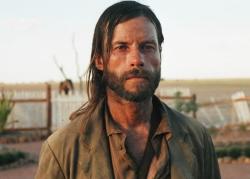"When the facts change, I change my mind. What do you do, sir?"--John Maynard Keynes
Two things: 1) Don't ask me who Keynes was. Wait ... *checking
Wikipedia* ... OK, so now I know he's
Tool's frontman. No, wait. I think that's
this guy. I get confused sometimes.
2) There aren't really facts, here. Just a re-visitation of 2007's
Best Picture winner, more than a year after seeing it for the first (and previously only) time. My impression back then: A harrowing, intense movie that seemed quite excellent ... except something always nagged at me, even as
No Country for Old Men swept the Big Oscars, over
the film I voted for (after swiping
Tom Berenger's ballot).
At the time I thought that nagging feeling was
No Country's surprisingly open-ended conclusion, or maybe the knowledge that I paid like $10 to park on South Beach in order to see the movie.
Now ...
 (This perfectly sized poster found at tutor2u)
(This perfectly sized poster found at tutor2u)... now, it's clear:
No Country is gripping, exceptionally crafted -- and almost fatally flawed.
The flaw is in the story.
It's not hard to see
No Country is about far more than a Texas welder (
Josh Brolin) who discovers $2 million that "belongs" to a psycho killer (
Javier Bardem) who is being trailed by an almost burned-out sheriff (
Tommy Lee Jones). The sheriff's opening voiceover -- never to return -- lets us know we're after something deep. Occasional life-related musings by a number of characters point to the nature of the world, of evil, of fighting it, of fighting for yourself, for others, etc. This is heavy stuff here, even without all the vicious killing (most of it done by the Oscar-winning Bardem's character).
Which is fine. Films don't always have to make big declarations, but those that do sometimes reach legendary status, as
No Country apparently did.
But ...
Those Big Idea films almost always take two paths to get there: 1) They state their thesis within the framework of a believable narrative, or 2) They present the issue with a tone of surrealism or magic realism or something that very clearly says "Suspend disbelief, everyone -- we're going for a ride."
No Country does neither. It wants to be gritty and intense and to exist in this world (or at least this world, circa 1980), but eschews logic while advancing its narrative and making its point. Too many actions/events make too little sense (Example: How does every character seem to know where his target is, almost at all times?)
Really, it's more a philosophical essay than anything else. Again, that's fine -- as long as you're not masquerading as a story. Otherwise, it's all allegory and little else. For some, that might work. Obviously, it did for Oscar voters and
critics.
Not for me, though. It left me wondering if
Cormac McCarthy's
book filled in those plot holes, explaining all those moments of wondering "But wait -- how did he ... ?" and "How could they know ... ?" and so on. It left me pining for some of the
Coen Brothers' previous gems, which said a little something about life AND told near-flawless (or acceptably oddball) stories.
It left me feeling conflicted. On one hand, it's good that the Academy honored a film so wholly different from the Best Picture stereotype, something that was dark and not afraid to be cruel and viciously clever. On the other, the aforementioned
There Will Be Blood was right there with
No Country, just as dark and just as clever and far less flawed -- begging Oscar to pick it, but with no success in the Most Important Category.
 (Pic found at HitFix)
(Pic found at HitFix)









